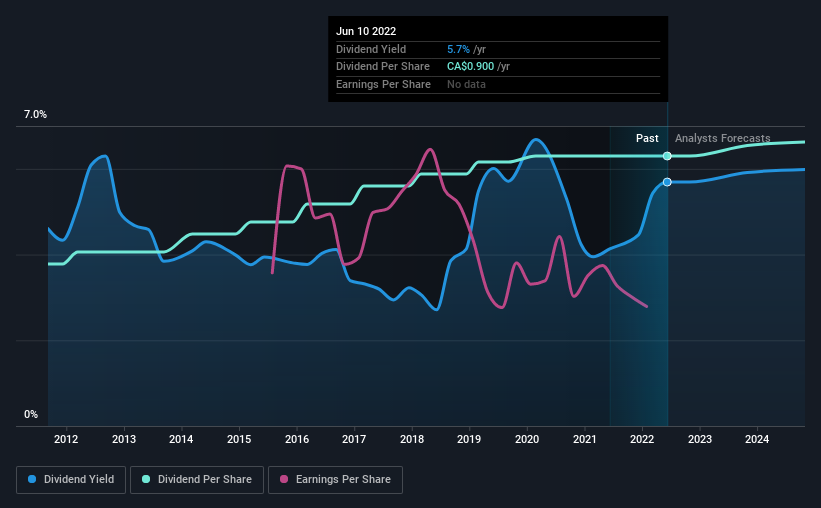Transcontinental (TSE:TCL.A) Will Pay A Dividend Of CA$0.23
Transcontinental Inc.'s (TSE:TCL.A) investors are due to receive a payment of CA$0.23 per share on 25th of July. This means the annual payment is 5.7% of the current stock price, which is above the average for the industry.
See our latest analysis for Transcontinental
Transcontinental's Payment Has Solid Earnings Coverage
We like to see robust dividend yields, but that doesn't matter if the payment isn't sustainable. Transcontinental was earning enough to cover the previous dividend, but it was paying out quite a large proportion of its free cash flows. The company is clearly earning enough to pay this type of dividend, but it is definitely focused on returning cash to shareholders, rather than growing the business.
The next year is set to see EPS grow by 4.7%. If the dividend continues on this path, the payout ratio could be 64% by next year, which we think can be pretty sustainable going forward.
Transcontinental Has A Solid Track Record
Even over a long history of paying dividends, the company's distributions have been remarkably stable. Since 2012, the dividend has gone from CA$0.54 to CA$0.90. This works out to be a compound annual growth rate (CAGR) of approximately 5.2% a year over that time. Companies like this can be very valuable over the long term, if the decent rate of growth can be maintained.
Dividend Growth May Be Hard To Come By
Investors could be attracted to the stock based on the quality of its payment history. Unfortunately things aren't as good as they seem. It's not great to see that Transcontinental's earnings per share has fallen at approximately 6.5% per year over the past five years. If the company is making less over time, it naturally follows that it will also have to pay out less in dividends. However, the next year is actually looking up, with earnings set to rise. We would just wait until it becomes a pattern before getting too excited.
In Summary
In summary, while it's good to see that the dividend hasn't been cut, we are a bit cautious about Transcontinental's payments, as there could be some issues with sustaining them into the future. While Transcontinental is earning enough to cover the dividend, we are generally unimpressed with its future prospects. We would probably look elsewhere for an income investment.
It's important to note that companies having a consistent dividend policy will generate greater investor confidence than those having an erratic one. Still, investors need to consider a host of other factors, apart from dividend payments, when analysing a company. As an example, we've identified 3 warning signs for Transcontinental that you should be aware of before investing. Looking for more high-yielding dividend ideas? Try our collection of strong dividend payers.
Have feedback on this article? Concerned about the content? Get in touch with us directly. Alternatively, email editorial-team (at) simplywallst.com.
This article by Simply Wall St is general in nature. We provide commentary based on historical data and analyst forecasts only using an unbiased methodology and our articles are not intended to be financial advice. It does not constitute a recommendation to buy or sell any stock, and does not take account of your objectives, or your financial situation. We aim to bring you long-term focused analysis driven by fundamental data. Note that our analysis may not factor in the latest price-sensitive company announcements or qualitative material. Simply Wall St has no position in any stocks mentioned.

 Yahoo Finance
Yahoo Finance 
